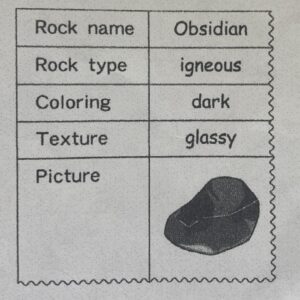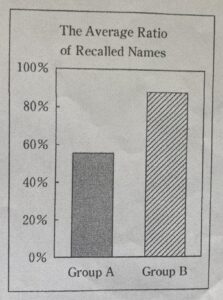模範解答・・・問題をやってから確認しましょう
それでは、先に模範解答です。
解答・・・問3各2点、他各3点(計16点)
問1ー1 問2ー1 問3ー【26】2【27】5 問4ー1 問5ー2
解説
「あなたの」先生は、効果的な勉強の仕方について2つの記事を読むように「あなた」
に頼みました。「あなた」は次の授業で学んだことを話し合う予定です。
Your teacher has asked you to read two articles about effective ways to study.
You will discuss what you learned in your next class.
Science Teacher, Stone City Junior High School
who struggle to learn. Recently, I found that their main way of learning was
to study new information repeatedly until they could recall it all. For example,
when they studied for a test, they would use a workbook like the example
below and repeatedly say the terms that go in the blanks: “Obsidian is igneous,
dark, and glassy. Obsidian is igneous, dark, and glassy …” These students
would feel as if they had learned the information, but would quickly forget it
and get low scores on the test. Also, this sort of repetitive learning is dull and
demotivating.
learning, new knowledge is constructed through students’ own experiences.
For my science class, students learned the properties of different kinds of
rocks. Rather than having them memorize the terms from a workbook. I
brought a big box of various rocks to the class. Students examined the rocks
and identified their names based on the characteristic they observed.
describe the properties of the rocks they studied. One issue, however, is that
we don’t always have the time to do contextual learning, so students will
still study by doing drills. I don’t think this is the best way. I’m still searching
for ways to improve their learning.

Professor, Stone City University
it can be beneficial. Repetition, though, can also work well. However, the
repetitive learning strategy he discussed, which is called “massed learning,” is
not effective. There is another kind of repetitive learning called “spaced
learning,” in which students memorize new information and then review it over
longer intervals.
The interval between studying is the key difference. In Mr. Oxford’s
example, his students probably used their workbooks to study over a short
period of time. In this case, they might have paid less attention to the content
as they continued to review it. The reason for this is that the content was no
longer new and could easily be ignored. In contrast, when the intervals are
longer, the students’ memory of the content is weaker. Therefore, they pay
more attention because they have to make a greater effort to recall what they
had learned before. For example, if students study with their workbooks, wait
three days, and then study again, they are likely to learn the material better.
Previous research has provided evidence for the advantages of spaced
learning. In one experiment, students in Groups A and B tried to memorize the
names of 50 animals. Both groups studied four times, but Group A studied
at one-day intervals while Group B studied at one-week intervals. As the figure
to the right shows, 28 days after the last learning session, the average ratio
of recalled names on a test was higher for the spaced learning group.
I understand that students often need to learn a lot of information in a
short period of time, and long intervals between studying might not be
practical. You should understand, though, that massed learning might not
be good for long-term recall.

問1 Oxford believes that 【 24 】.
① continuous drilling is boring
② reading an explanation of terms is helpful
③ students are not interested in science
④ studying with a workbook leads to success
問2 In the study discussed by Lee, students took a test【 25 】after their
final session.
① four weeks
② immediately
③ one day
④ one week
問3 Lee introduces spaced learning, which involves studying at 【 26 】
intervals, in order to overcome the disadvantages of 【 27 】learning
that Oxford discussed.
(Choose the best one for each box from options ①〜⑥.)
① contextual
② extended
③ fixed
④ irregular
⑤ massed
⑥ practical
問4 Both writers agree that 【 28 】is helpful for remembering new
information.
① experiential learning
② having proper rest
③ long-term attention
④ studying with workbooks
問5 Which additional information would be the best to further support Lee’s
argument for spaced learning?【 29 】
① The main factor that makes a science class attractive
② The most effective length of intervals for spaced learning
③ Whether students’ workbooks include visuals or not
④ Why Oxford’s students could not memorize information well
それでは、解説に入ります。
解説 – 勉強の仕方に関する2つの記事
👉問題はどれも「ある設定」のもとでの「英文読解」なので、
一番最初にするべきことは、その「設定」をしっかり把握することです。
▶︎その「設定」が、問題の最初に説明されているので、
まずは、それをしっかりと確認します。
【設定】
Your teacher has asked you to read two articles about effective ways to
study. You will discuss what you learned in your next class.
[登場人物]
・「あなたの先生」
・「あなた」
[設定]
・「あなたの先生」が「あなた」にお願いしたことがあります。
▶︎それは、効果的な学習方法についての2つの記事を読むこと
▶︎「あなた」は、その記事で学んだことを次の授業で話し合うことになっている
◎そして、この後にその「2つの記事」が示されています。
記事のタイトルは下記の通り。
[1] How to Study Effectively: Contextual Learning!
– Tim Oxford ( Science Teacher, Stone City Junior High School)
※効果的な学習方法:文脈からの学び
– ティム・オックスフォード (理科教師、ストーン・シティ中学校)
[2] How to Make Repetitive Learning Effective
– Cheng Lee ( Professor, Stone City University)
※反復学習をを効果的にする方法
– チェン・リー (教授、ストーン・シティ大学)
👉ここまでを、
理解した上で、「先に」問題の選択肢をチェックした方が、時間の短縮につながると
思います。
問1について
【選択肢のチェック】
問1 Oxford believes that 【 24 】.
① continuous drilling is boring
② reading an explanation of terms is helpful
③ students are not interested in science
④ studying with a workbook leads to success
【内容】
問1 オックスフォードさんは【 24 】と信じている。
① 継続的はドリル学習は退屈だ。
② 用語の説明を読むことは役にたつ。
③ 生徒たちは理科に興味がない
④ ワークで勉強することは成功につながる
👉最初の記事がオックスフォード先生の「記事」なので、ここを読みながら
選択肢を確認していきます。
① continuous drilling is boring
▶︎一段落目の最後にこのような英文があります。
” Also, this sort of repetitive learning is dull and demotivating.”
「また、この種の繰り返し学習は、つまらなく、モチベーションを下げるものである」
すなわち、単純なドリル学習に対しては、反対の意見なので、⭕️となります。
※これが、正解ですが、一応念のため②以降もチェックします。
② reading an explanation of terms is helpful
▶︎「効果的な学習」についての主張であるが、”用語の説明を読む” ことに関しては、
特別な言及はされていないので、❌となります。
③ students are not interested in science
▶︎オックフォード先生は、理科の教師であるが、「勉強の仕方」については主張して
いるが、「生徒の理科の対する興味・関心」については明記されていないので、❌
④ studying with a workbook leads to success
▶︎ 2段落の真ん中あたりに workbook が出てきます。
” Rather than having them memorize the terms form a workbook, I brought
a big box of various rocks to the class.”
「ワークにある用語を生徒に暗記させるよりも、私は学級に様々な石が入った大きな
箱を持ってきました。」ここから、オックスフォード先生は、ワークを使っての学習
に対しては、決して肯定的ではないとわかるので、❌
👉ここから、正解は、
① continuous drilling is boring となります。
※ Oxford believes that continuous drilling is boring. 【 24 】

問2について
【選択肢のチェック】
問2 In the study discussed by Lee, students took a test【 25 】after their
final session.
① four weeks
② immediately
③ one day
④ one week
【内容】
問2 リー先生によって議論された研究では、生徒は最後のセッションの【 25 】後に
テストを行なった。
① 4週間後
② すぐに
③ 1日後
④1週間後
👉リー先生による記事は、2番目の記事です。
そして、リー先生が述べている spaced learning に関しての研究結果については
3段落目に書かれています。最後のセッションについては下記のような文があります。
“As the figure to the right shows, 28 days after the last learning session,
the average ratio of recalled names on a test was higher for the spaced learning group.”
「右の数字が示すように、最後の学習セッションの28日後、テストで思い出された名前の
平均の割合は、間隔学習のグループに関してはより高かった」とあるので、
👉ここからすると、正解は、
① four weeks. となります。(4週間:4週×7日=28日)
問3について
【選択肢のチェック】
問3 Lee introduces spaced learning, which involves studying at 【 26 】
intervals, in order to overcome the disadvantages of 【 27 】learning
that Oxford discussed.
(Choose the best one for each box from options ①〜⑥.)
① contextual
② extended
③ fixed
④ irregular
⑤ massed
⑥ practical
【内容】
問3 リー先生は、間隔学習を紹介します、それはオックスフォード先生が話した【 27 】
学習の欠点を克服するために【 26 】な間隔をおいた学習を含みます。
① 文脈に関わる
② 拡大された
③ 固定された
④ 不規則な
⑤ 集中した
⑥ 実際的な
👉同じくリー先生の記事に注目します。問題から
「リー先生と、オックスフォード先生の記事で示された学習方法との関連」を
見つけるといいようです。
◎まずは、オックスフォード先生が記事の中で主張しているのは、
タイトルからもわかるように “Contextual Learning”「文脈からの学習」です。
※ contextual learning というのは、その記事からすると
単純な繰り返し学習を否定して、「生徒自身の経験」を通して構築される知識
が大切だとするものです。
“In this kind of learning, new knowledge is constructed through students’
own experiences.”
◎次にこのオックスフォード先生との関連をリー先生の記事を探すと…
1段落目にはこのような文があります。
“Mr. Oxford‘s thoughts on contextual learning were insightful. I agree that
it can be beneficial. Repetition, though, can also work well. However, the
repetitive learning strategy he discussed, which is called “massed learning,” is
not effective. There is another kind of repetitive learning called “spaced
learning,” in which students memorize new information and then review it over
longer intervals.”
▶︎ここからすると、
・オックスフォード先生の contextual learning についての考えを認めている
・それでも繰り返し学習は役にたつ
・オックスフォード先生が話していた massed learning は効果的ではない
・もう1つの繰り返し学習 spaced learning を紹介している
※3つの学習方法が出ていますが、それを確認しましょう。
□ contextual learning 「文脈からの学習:文脈学習」
→生徒が自分で「経験」させることにより知識を得る方法
□ massed learning「集中学習」- 繰り返し学習の1つ
→あることを覚えてしまうまでひたすら繰り返し学習する方法
□ spaced learning「間隔学習」- 繰り返し学習の1つ
→ massed learning との大きな違いは、一回覚えたら “review it over longer
intervals”「より長い間隔をあけて復習(繰り返す)」する学習方法
👉ここから、正解は、
【 26 】② extended 【 27 】⑤ massed となります。
( extended intervals / massed learning )
※ Lee introduces spaced learning, which involves studying at extended
intervals, in order to overcome the disadvantages of massed learning
that Oxford discussed.
問4について
【選択肢のチェック】
問4 Both writers agree that 【 28 】is helpful for remembering new
information.
① experiential learning
② having proper rest
③ long-term attention
④ studying with workbooks
【内容】
問4 両方の筆者ともに【 28 】が新しい情報を覚えるの役に立つと同意している。
① 経験的な学習
② 適切な休暇を取ること
③ 長い間注意すること
④ ワークで勉強すること
👉少し難しいそうに見えますが、
「問3」の部分で、ある程度2人の先生の考えを理解できていれば簡単です。
◎オックスフォード先生は、
その記事のタイトルでもわかるように、contextual learning が効果的であると
いう考えです。
◎リー先生の記事の最初の方に
“Mr. Oxford’s thoughts on contextual learning were insightful. I agree that
it can be beneficial.”
「 contextual learning についての考えは洞察力があった。それが役にたつ可能性
があることには同意する」とあるので、
contextual learning と同じ意味のものを選びます。
▶︎オックスフォード先生の記事の中で、contextual learning については
through students’ own experiences「生徒自身の経験を通して」がポイントと
なるとあるので、
👉ここから、正解は、
① experiential learningとなります。
※ Both writers agree that experiential learning is helpful for remembering new
information.
問5についてiu bn
【選択肢のチェック】
問5 Which additional information would be the best to further support Lee’s
argument for spaced learning?【 29 】
① The main factor that makes a science class attractive
② The most effective length of intervals for spaced learning
③ Whether students’ workbooks include visuals or not
④ Why Oxford’s students could not memorize information well
【内容】
問5 どの補足的な情報が間隔学習のリー先生の主張をさらにサポートするに一番良い
だろうか。【 29 】
① 理科の授業を魅力的なものにする主な要因
② 間隔学習にとって一番効果的なインターバルの長さ
③ 生徒のワークに視覚的のものがあろうがなかろうが
④ オックスフォード先生の生徒たちがなぜ情報を上手に記憶することができないのか
👉リー先生の主張とは、
タイトル “How to Make Repetitive Learning Effective” からもわかるように
「繰り返し学習」を効果的にさせる方法です。
▶︎「問3」にあるように、リー先生は massed learning(集中学習 – 繰り返し学習の
1つ)よりも、spaced learning(間隔学習 – 一旦覚えたものを長い期間を置いて復習
する繰り返し学習の1つ)が効果的であると考えています。
▶︎ここからすると、
spaced learning での「長い期間」が、どのくらいだと良いのかという調査結果が
あると役に立ちそうです。
👉そこから、正解は、
② The most effective length of intervals for spaced learning となります。
これで、
第4問 を終わります。
次は、第5問 の解説です。



コメント